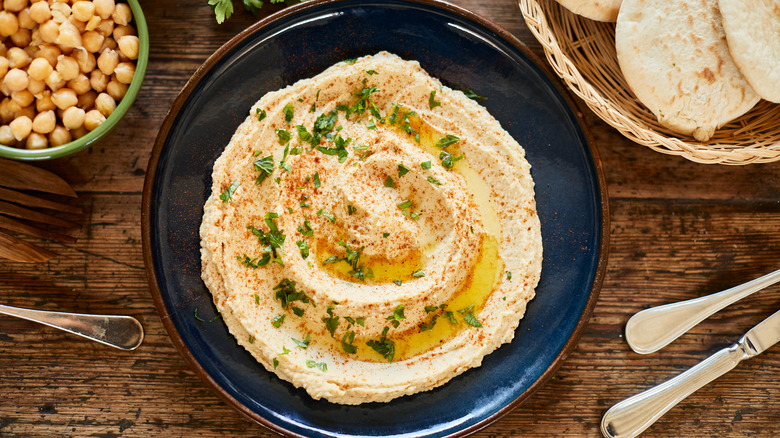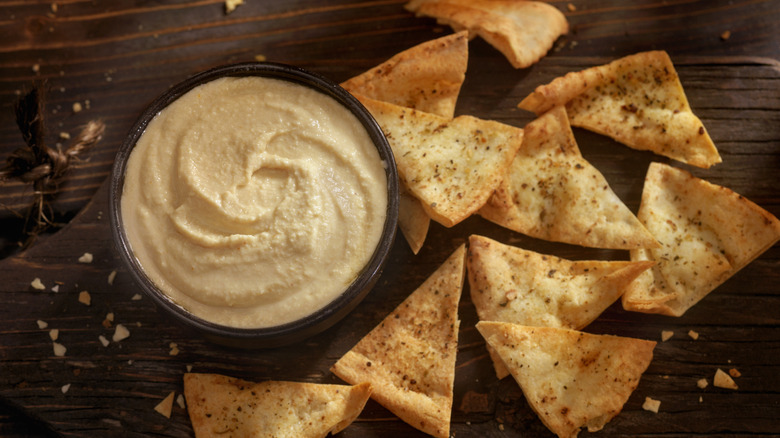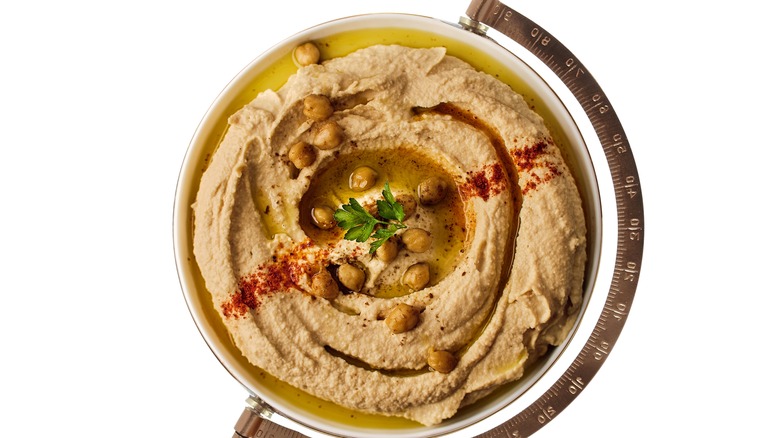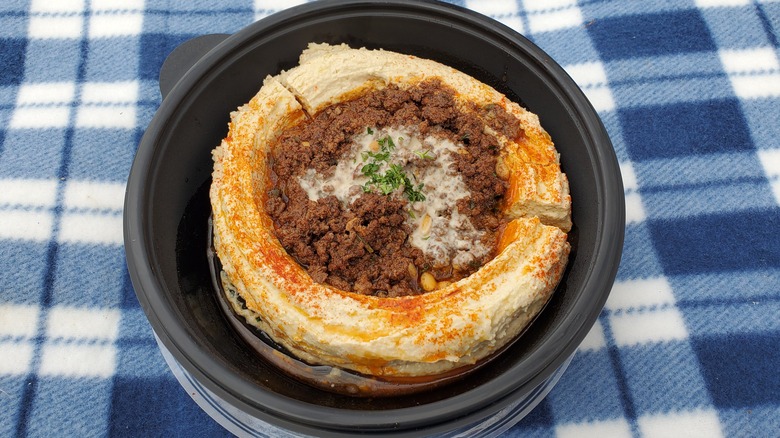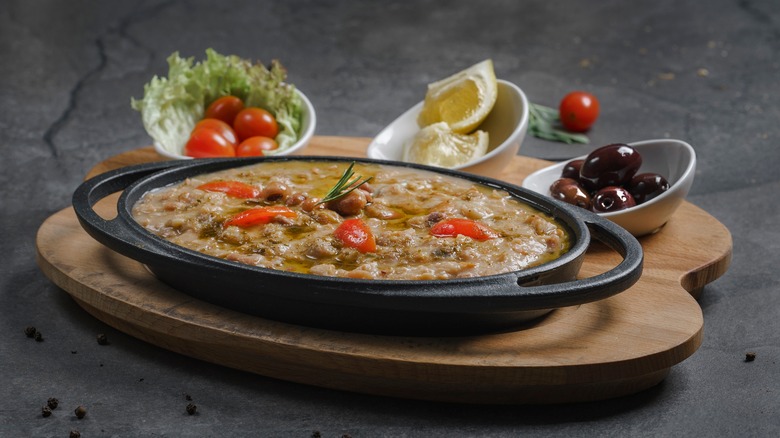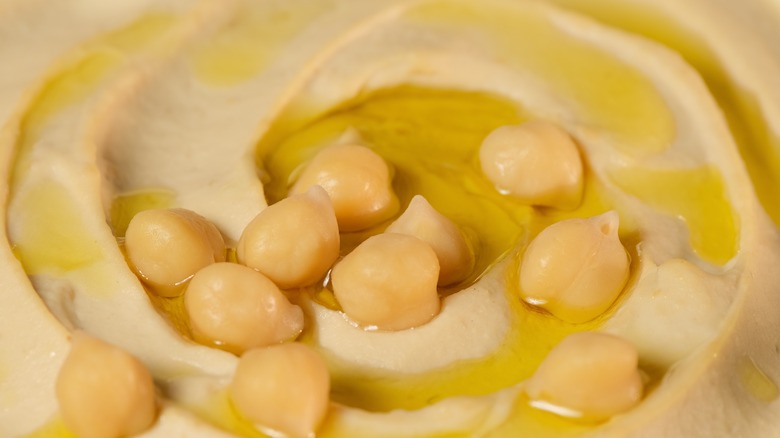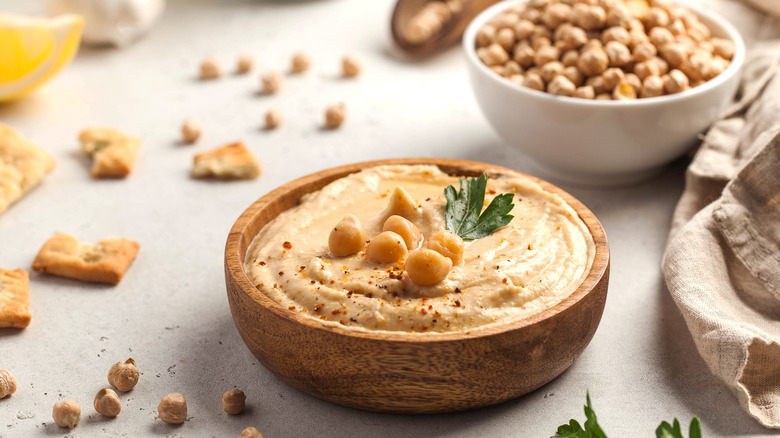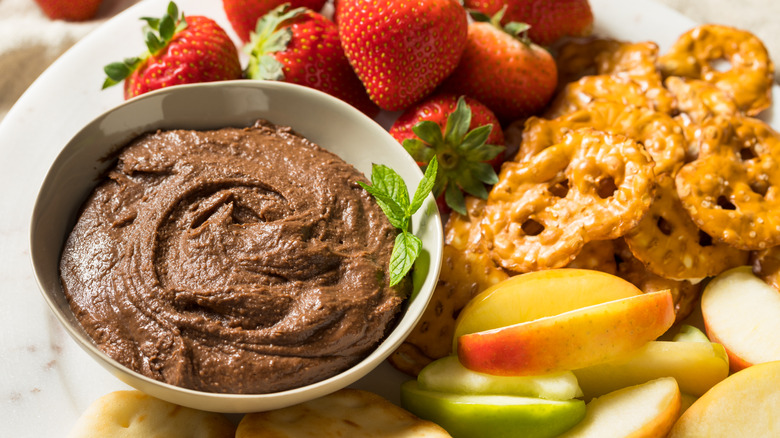7 Things You Didn't Know About Hummus
At first glance, nothing could seem more benign and drama-free than hummus. It's core ingredient is a humble, mildly flavored staple: chickpeas. On the table, it presents itself as a simple bowl of beige goop. If you saw it on a buffet without knowing what it was, there's a good chance you'd overlook it completely — or wonder why anyone would bother choosing it over spicier, more colorful options.
But its mild-mannered wholesomeness is part of the appeal. Like a classic black dress, it can be dressed up or down to suit a range of tastes and occasions. This, and the fact that its ingredients are easily accessible and affordable, has made hummus an object of regional and national pride throughout the Mediterranean and Middle East.
This has also made hummus the subject of debate: Who originally invented it? Is it, at its origins, an Israeli dish, a Lebanese treat, or a creative Greek invention? Everyone, it seems, wants to take credit for those humble bowls of seasoned chickpea puree. The real story is neither simple nor clear, but a non-debatable point is that hummus is deeply beloved, and increasingly becoming popular all over the world.
Hummus may have been mentioned in the Bible
One reason the origins of hummus are so murky is that it's an old dish; like a lot of really, really old things, it didn't leave behind a reliable paper trail.
It's clear that the basic components of hummus as we know it today (chickpeas and tahini) have been around for a long time –- chickpeas were grown as long as 10,000 years ago in Turkey and tahini is mentioned in cookbooks dating back to the 13th century. What's not clear, however, is when that first person had an idea to mash chickpeas and mix them with tahini, or where this may have taken place.
Many Israeli cooks claim it was one of their ancestors who invented the tasty dip. "It's a Jewish food," Israeli chef Tom Kabalo has insisted. "It was mentioned in our Bible 3500 years ago."
As evidence, he and others cite a passage from the Book of Ruth: "Come hither, and eat of the bread, and dip thy morsel in the hometz." Although it may sound pretty compelling, there's a catch: The modern Hebrew word hometz translates as vinegar, not hummus. So, as far as some scholars are concerned, it's unclear if that cryptic Bible verse was actually an invitation to enjoy hummus or referred to something else entirely.
Hummus became yet another flashpoint in the Middle East conflict
As if land, oil, water rights, and religion weren't enough fodder for conflict in the Middle East, another commodity has become a hotly disputed point of contention: the question of who gets to claim hummus as their national dish.
Researchers have cited various pieces of evidence in their attempts to place the origin of hummus in places like Syria, Egypt, Israel, and Lebanon; hummus promoters in Israel and Lebanon have become so passionately committed to claiming the dish as their own that a protracted legal battle has helped define their dynamic. In 2008, with the commercial popularity of hummus soaring, the Association of Lebanese Industrialists became incensed by the growing consumer identification of hummus with Israeli cuisine and culture. It sued Israel for copyright infringement, petitioning the EU to define hummus as specifically Lebanese.
Both efforts failed, however, and today the "hummus wars" of 2008 remain a textbook example of the lengths cultures will go to claim a food as their own. It also solved nothing; the jury is still out as to where hummus originated. At this point, some are simply tossing up their hands and declaring it just doesn't matter. "I think it is an old and stupid debate that is not worth one's attention," food historian Liona Gvion told the BBC in 2017.
Meat-topped hummus is a hearty regional variant
While it may be unclear who invented hummus or where, one thing that is clear is that multiple countries and cultures have embraced and added their own local spins — some of which may be surprising if all you've ever had is supermarket hummus.
For example. if you're among those who always considered hummus a pedestrian fallback dish polite people keep around for their vegan friends, you might enjoy trying hummus bil-lahmi, a rich Syrian variant in which a bed of hummus is topped with a pile of spiced minced meat, typically beef.
The meat is usually a simple blend of ground beef sauteed with aromatics such as onions and garlic and seasoned with flavorings like cumin, oregano, and baharat or a Middle Eastern spice blend containing warm spices including cinnamon, cloves, cardamom, and paprika. The contrast between the warm spiced meat and cool, smooth hummus makes this variant particularly tantalizing. While it's typically served as an appetizer, the dish is substantial enough to be the main dish for a casual meal. To add extra pizazz and visual appeal, you could also top the meat with additional tahini sauce, or a garnish of toasted pine nuts.
In Egypt, hummus comes topped with even more legumes
One probable reason why hummus is such an enduring, popular dish is that it's an inexpensive, readily accessible source of protein. Chickpeas are among the earliest legumes cultivated by humans, with some of the earliest evidence of their use coming from neolithic sites in present-day Turkey and Syria. In essence, people in the Middle East have been depending on chickpeas, in some form or another, as a regular source of nutrition for a very long time.
But chickpeas aren't the only legume grown and consumed in the Middle East. In Egypt, fava beans are a go-to ingredient of choice. A common breakfast in Egypt — and source of national pride — is ful medames, long-stewed fava beans seasoned with garlic, cumin, and lemon, then enriched with a swirl of tahini.
Egyptian street vendors spend hours patiently stewing the beans, then serve them up to hungry locals with pita bread for dipping. If you're unfamiliar with the dish, you might mistake it for a hot, chunky variant of hummus. But Egyptian cooks consider them very distinct from one another. A popular hummus variant in Egypt even features a bed of hummus topped with ful medames, offering diners a double dose of distinct, plant-based protein.
The world's largest platter of hummus contained over 10,000 kg
While hummus has become globally popular, it remains a source of national and regional pride in the regions where it has historically been served. In one especially noteworthy case, a Lebanese manufacturing group considered hummus such a central part of Lebanon's national identity that it was willing to take legal action to claim it as uniquely theirs. What triggered that group was the rising success of commercial hummus brands boasting the dip's Israeli roots and cementing its reputation among consumers as an Israeli creation.
Their legal efforts failed, but Lebanese hummus lovers didn't back down. If they couldn't be the single, official creator of authentic hummus, they could still make sure the world knew how seriously they took the stuff. In 2009, Lebanon's minister of tourism decided the nation's cooks should make the world's largest plate of hummus, earning a place in the Guinness Book of World Records. While the initiative was successful, a group of Israeli cooks, seeking revenge, topped their efforts the following year with an even bigger plate of hummus (served in a giant satellite dish). The year after that, Lebanon doubled down, topping the Israeli effort with an even bigger platter containing 10,452kg (the number of square kilometers covered by Lebanon) of hummus. The record has stood ever since.
These tips will help you make ultra-smooth hummus at home
Home cooks who regularly enjoy store-bought hummus, or ordering it at restaurants, might be tempted to make their own at home. This will not only expand their cooking repertoire and maybe save a few pennies, but also allow them creative freedom to tweak the flavors to create their own original versions. But despite their best efforts, even experienced cooks can find themselves with grainy, lumpy hummus rather than the ultra-smooth concoction they hope to achieve. Other times, one of the flavor components — the garlic, tahini, or both — may come across as unpleasantly harsh. Thankfully, there are ways to prevent such problems.
First, to ensure the fresh garlic in your hummus doesn't bite, puree it with lemon juice; this prevents harsh-tasting compounds from forming and ensures a balanced flavor. Also, the quality of tahini you use matters. Because it's such a dominant part of the recipe, it's wise to choose a good brand made with fresh sesame seeds.
Finally, to ensure your hummus turns out silky smooth, you need to ensure your chickpeas are thoroughly cooked — soft enough to be considered overcooked in other contexts. Adding baking soda to the boiling water when cooking your chickpeas (dried offers a better flavor than canned) will also help soften them. While many cooks recommend skinning chickpeas when making hummus to ensure smoothness, cooking them to the point of mushiness gives the same results and eliminates the need for this labor-intensive step.
Sweet hummus is a recent – and contentious – innovation
It's impossible to explore the hummus display at a well-stocked supermarket without noticing something odd: Hummus that features decidedly non-traditional flavors, from chocolate to caramel apple. But whether you think it's a genius idea or a sure sign the apocalypse is at hand, dessert hummus has become unavoidable. It's been lurking at the periphery of the food world for longer than you might think; "dessert hummus" made its first appearance as a Google search term way back in 2005.
While the first known commercial brand of sweet hummus was introduced in 2009, the concept of sweet hummus first gained mainstream appeal in 2017, when entrepreneur Makenzie Matzluff pitched her "Delighted By" line of sweet hummus on "Shark Tank," promoting its benefits as a healthier alternative to other sweet snacks. It soon caught on with those looking for vegan or gluten-free alternatives to sweets, as well as followers of keto and paleo diets.
But Middle Eastern cooks (as well as fans of traditional Middle Eastern cooking) consider it a form of cultural appropriation, if not outright desecration, and the first brand introduced in the U.S. in 2009 — called Crazy Camel Dessert Hummus — likely didn't help. "In this region," Israeli historian Dafna Hirsch said in 2022, "it is pretty much considered an abomination."

